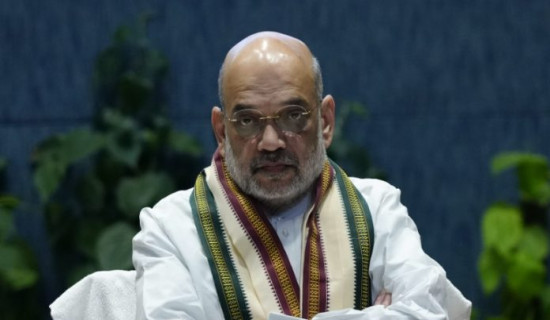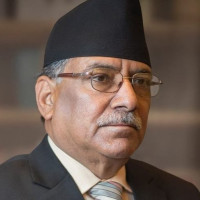- Saturday, 26 April 2025
Tremors Of Trump's Comeback
With Donald J Trump assuming office on 20th January, the American politics embarked on a new trajectory. The executive orders which he signed on his first day in the Oval Office signaled the direction of American politics for the next four years. Donald Trump had campaigned on the slogan of making America great again, pledging that, if elected, his government would implement stricter border policy, curb immigration, reduce military engagement abroad, roll back environmental regulation and withdraw from Paris Climate Agreement to achieve energy independence.
For many, the above commitments appeared unachievable for any US administrations given the diversity and division in contemporary American society. But the series of steps which Trump took on the very first day in office signaled his determination to implement the promises he had made during his election campaign. To quote famous analyst Fareed Zakaria, "Through executive action, Trump renamed the Gulf of Mexico as the 'Gulf of America', effectively closed the southern border to asylum-seekers, pulled the US out of the Paris Climate Accord and the World Health Organisation (WHO), declared that there are only two genders, sought to redefine birthright citizenship, and designated Mexican drug cartels as foreign terrorist organisations".
Shockwaves
The series of executive orders which Trump signed Monday has sent shockwaves across the world. In the home front, the president's anti-immigration orders, his implicit refusal to admit the existence of third gender, the blanket pardon for the offenders of 6 January 2020 incident that took place in the Capitol Hill reflect a clear attempt to redefine American social norms, legal-judicial system and the perception on diversity and social harmony. Considering the deep partisan division that had surfaced during the political transition at the end of his previous presidential term, the steps, taken on the day of his inauguration, are certain to have far-reaching repercussions.
Away from the national front, these executive orders are also likely to spark debate and polarisation leading to global realignment of forces. President Trump has declared a 90-day freeze on foreign aid purportedly to assess whether these aids align with the national interest of the United States. While the rationale for the presidential decision on freezing foreign aid is framed in more ambiguous terms, foreign policy analysts appear inclined to connect it to the massive aid being directed to Ukraine to support its defense in the ongoing war with Russia.
During his election campaign, President Trump frequently claimed he could stop Russia-Ukraine war within 24 hours of assuming office. He even publicly acknowledged Russia's legitimate interest and sharply criticized Zelensky's policy of involving NATO in its war against Russia. President Trump even humorously remarked that "Zelensky was the best salesman of the world" as he walked off with 60 billion dollars each time he visited the United States.
During his previous term in office, Trump had expressed his skepticism about the sustainability of US's security partnership with NATO, criticising the small share of cost borne by the NATO countries for the upkeep of their military forces. From the day one, Trump appears to have sent unmistakable signals regarding the potential strains that the European countries could face in the transatlantic alliance in the coming months and years if they do not significantly raise the level of cost sharing.
President Trump did not provide specifics on the volatile situation in West Asia during his inauguration nor did he initiate any executive action aimed at mitigation of tension in this region. Soon after his election, he had threatened HAMAS to release hostages before he assumed office or face "even worse consequences". Prophetically, a ceasefire, although fragile, has been brokered between Israel and HAMAS just before his inauguration but Trump may face a significant challenge in achieving a durable and just peace in that region.
Trump has shown an open pro-Israel bias on Israel-Palestinian issue. He also appears less sensitive to the loss of innocent lives in Gaza than in Ukraine. In the case of Russia-Ukraine war, he singles out NATO's miscalculated intervention in Ukraine as the cause of the conflict and advocates peace by acknowledging legitimate interest of Russia. However, in sharp contrast, he places blames on HAMAS for triggering war in the region by launching terrorist attack on Israel on 7 October 2022. Curiously, however, he does not comment on the genocide and destruction caused in Gaza by the retaliatory actions of Israel, although more than 45 thousand civilians, mostly women and children have lost their lives.
Trump's decision to withdraw from Paris Climate Agreement and World Health Organisation (WHO) stands out as more devastating than other executive orders. At a time when climate change impacts are signaling towards a grim future for the humanity, the decision of the most powerful country of the world to double down on fossil fuel - in total disregard for global fight against climate emergency – is likely to attract global condemnation.
Insensitive move
Similarly, the US's decision to withdraw from WHO could be seen as a highly insensitive move distancing itself from the obligation towards global health governance. The decision undermines the US's commitment to promoting public health as part of of global effort to prevent future outbreak of epidemic s and pandemics. The US has been historically the largest donor to the WHO. According to Statista, the leading online data platform, as of 2022-23, the US was the largest contributor to WHO approximately $1.28 billion, which is about 12 per cent of its cost. China is the second largest donor to WHO projects.
The decision of the US to withdraw from WHO will significantly impact many health related projects aimed at preventing transmission of diseases in the communities and advancing vaccine development against emerging new epidemic and pandemic diseases. To conclude, President Trump's executive orders signed on the first day of his presidency signal a shift in the USA's initial commitment to internationalism and multilateralism. In the midst of present day global crisis, its move to disengage from international multilateral mechanisms risks isolating it in the global platforms, creating opportunity for other powerful countries of the world to form alliances challenging US's global leadership.
(Dr. Bharadwaj is former ambassador and former chairperson of Gorkhapatra Corporation. bharadwajnarad@gmail.com.)










-original-thumb.jpg)






